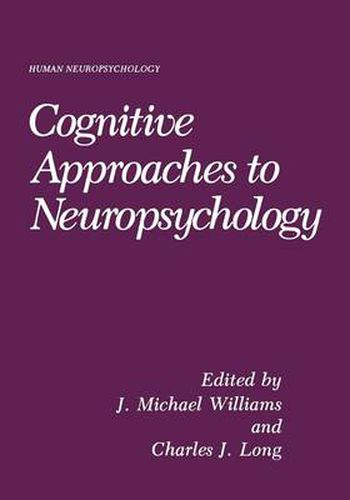Readings Newsletter
Become a Readings Member to make your shopping experience even easier.
Sign in or sign up for free!
You’re not far away from qualifying for FREE standard shipping within Australia
You’ve qualified for FREE standard shipping within Australia
The cart is loading…






This title is printed to order. This book may have been self-published. If so, we cannot guarantee the quality of the content. In the main most books will have gone through the editing process however some may not. We therefore suggest that you be aware of this before ordering this book. If in doubt check either the author or publisher’s details as we are unable to accept any returns unless they are faulty. Please contact us if you have any questions.
Since its early development, neuropsychology has examined the manner in which cognitive abilities are mediated by the brain. fudeed, all of neuropsy chology, and especially clinical neuropsychology, could be subsumed under this general investigation. However, a variety of factors impeded the close as sociation of neuropsychologists and cognitive/experimental psychologists. These factors were prominent influences in both camps, which kept the study of cognition away from a consideration of biological foundations and kept neuropsychology theoretically impoverished. In recent years, these factors have diminished and cognitive neuropsychology has become a popular term to describe the new movements to join the study of cognition with the study of brain function. The factors which kept these areas separate were manifestations of his torical trends and represent a social distance which largely happened by acci dent. The first and perhaps most important factor was that early investigators of cognition and brain function were not psychologists. Most were neurolo gists or otlier neuroscientists who were excellent observers of behavior fol lowing brain injury but had virtually no theoretical context of cognitive psy chology, which would allow them to expand and deepen their understanding of the behavior they were observing. As more psychologists who have such a context have observed the consequences of brain disorders, especially aphasia and amnesia, the study of them has become far more comprehensive as theo ries of language and memory derived from cognitive psychology have been incorporated into the investigations.
$9.00 standard shipping within Australia
FREE standard shipping within Australia for orders over $100.00
Express & International shipping calculated at checkout
This title is printed to order. This book may have been self-published. If so, we cannot guarantee the quality of the content. In the main most books will have gone through the editing process however some may not. We therefore suggest that you be aware of this before ordering this book. If in doubt check either the author or publisher’s details as we are unable to accept any returns unless they are faulty. Please contact us if you have any questions.
Since its early development, neuropsychology has examined the manner in which cognitive abilities are mediated by the brain. fudeed, all of neuropsy chology, and especially clinical neuropsychology, could be subsumed under this general investigation. However, a variety of factors impeded the close as sociation of neuropsychologists and cognitive/experimental psychologists. These factors were prominent influences in both camps, which kept the study of cognition away from a consideration of biological foundations and kept neuropsychology theoretically impoverished. In recent years, these factors have diminished and cognitive neuropsychology has become a popular term to describe the new movements to join the study of cognition with the study of brain function. The factors which kept these areas separate were manifestations of his torical trends and represent a social distance which largely happened by acci dent. The first and perhaps most important factor was that early investigators of cognition and brain function were not psychologists. Most were neurolo gists or otlier neuroscientists who were excellent observers of behavior fol lowing brain injury but had virtually no theoretical context of cognitive psy chology, which would allow them to expand and deepen their understanding of the behavior they were observing. As more psychologists who have such a context have observed the consequences of brain disorders, especially aphasia and amnesia, the study of them has become far more comprehensive as theo ries of language and memory derived from cognitive psychology have been incorporated into the investigations.